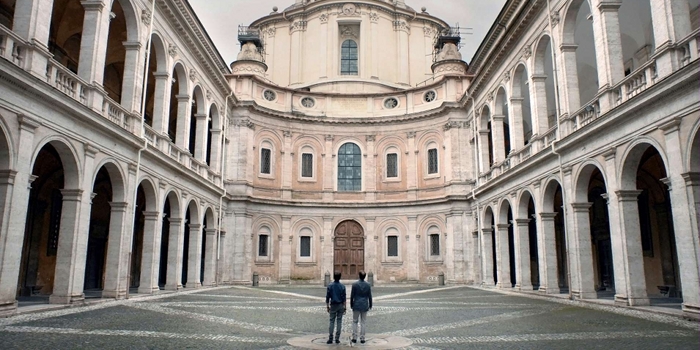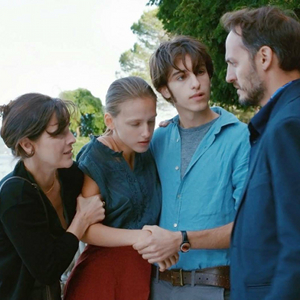
La Sapienza (2014)
Cast: Fabrizio Rongione, Christelle Prot, Ludovico Succio
Director: Eugène Green
Country: France | Italy
Genre: Drama
Editor’s Notes: The following review is part of our coverage of the New York Film Festival. For more information on the festival visit www.filmlinc.com/nyff2014 and follow NYFF on Twitter at @TheNYFF.
Disconnect lies at the heart of La Sapienza. An architect disconnected from his passion. His wife emotionally disconnected from her husband. Even the film’s two opening montages – one of renaissance architecture accompanied by classical choral music, the other of modern architecture under cloudy skies over which the protagonist gives a passionately worded but absently delivered speech – seem to highlight the distance between two time periods and the disconnect that has emerged between them. Indeed, for much of the film, director Eugène Green seems determined to disconnect the audience from his production.
Disconnect lies at the heart of La Sapienza. An architect disconnected from his passion. His wife emotionally disconnected from her husband.
Dardenne brothers go-to-guy Fabrizio Rongione plays Alexandre, our haunted, almost robotic hero. After winning an award for his contributions to architecture, he finds himself the victim of bureaucratic meddling when his latest project is rejected by government ministers for not allowing enough room for population growth; it is suggested balconies with potted plants might remove the need for the grand parkways Alexandre has planned. Needing a break, he returns to an abandoned project to write a book about the Italian baroque architect Francesco Borromini. His estranged wife Aliénor (Christelle Prot), facing her own bureaucratic stagnation at work, comes along for the ride.

At Borromini’s birthplace in Switzerland, the couple comes no closer to bridging the distance between them. But a chance encounter with a young would-be architect, Goffredo (Ludovico Succio), sees Alexandre take the boy with him to Rome (not begrudgingly, but certainly disinterestedly) to trace more of Borromini’s works. Master soon learns from pupil in surprising ways.
Architecture is the name of the game here, and Green frames many of his shots as if encased within an arch. Symmetrical imagery is housed within frames that barely budge an inch – the few instances where the camera pans or tilts are a minor shock to the system. Faces like stone reliefs stare straight out of the screen down the lens of the camera as they deliver their philosophical musings on life, light and love.
Slow almost to a fault, the film is also provocatively artificial and alienating. But somehow it manages to find some very human depth in the curves of buildings and faces and in its mundane drama.
Stranger still is the performances, which are intentionally theatrical, almost in the style of Chekhov. Characters rarely look at one another as they speak, often staring reflectively out into the distance. When Rongione and Prot stand next to one another and have entire conversations while facing the same direction, it creates a curious effect, almost as if a split screen were being utilized. The shot-reverse-shots progressively move in towards the speakers, as if studying their faces for more detail, which the withdrawn performances barely let escape. Despite this, the actors find remarkable humour in this sub-reality of performance. Turns of phrase are broken down with great wit, and the French language suffers some amusing satirical barbs.
The subplot of Aliénor bonding with Goffredo’s sister Lavinia (Arianna Nastro) definitely suffers as the boys have their adventures in Italy (an awkward candlelit dinner with pretentious art students at the Medici Palace is a highlight), but there is still room for the actresses to help bolster the film’s themes. However, the curiously symbiotic relationship between the siblings is one of the film’s most intriguing aspects, and it is never addressed quite satisfactorily.
Slow almost to a fault, the film is also provocatively artificial and alienating. But somehow it manages to find some very human depth in the curves of buildings and faces and in its mundane drama. The theme that knowledge is not enough to live with, that one must achieve sapience (wisdom), is hammered home a little heavily, but it is no less worthy a concept for that. A scene where the architects visit Borromini’s Church of Saint Yves at La Sapienza, only to find it locked up due to more bureaucratic webbing that means there’s only one key, sums it all up so well. Like a church façade, people can be endlessly beautiful to behold, but the source of light and inspiration – true beauty – is always found within.
Often deliberately frustrating, La Sapienza sets out to make its philosophical point, and however much it crawls, gets there. The artificiality of the performances and framing only serves to heighten the sense of uniqueness the film emits. That it is eye-wideningly stunning to behold from start to finish is the real reason to give this one a try.



